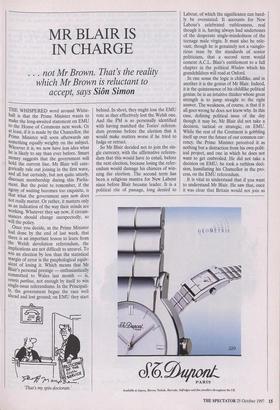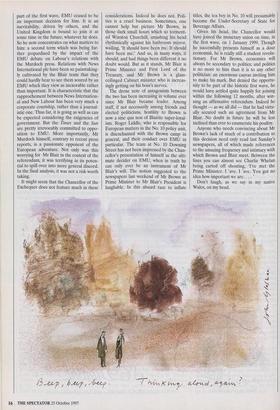MR BLAIR IS IN CHARGE
. . . not Mr Brown. That's the reality which Mr Brown is reluctant to
THE WHISPERED word around White- hall is that the Prime Minister wants to make the long-awaited statement on EMU to the House of Commons next week. Or at least, if it is made by the Chancellor, the Prime Minister will soon afterwards say something equally weighty on the subject. Whoever it is, we now have less idea what he is likely to say than ever before. Smart money suggests that the government will hold the current line. Mr Blair will cate- gorically rule out joining in the first wave, and all but certainly, but not quite utterly, discount membership during this Parlia- ment. But the point to remember, if the agony of waiting becomes too exquisite, is that what the government says now does not really matter. Or rather, it matters only as an indication of the way their minds are working. Whatever they say now, if circum- stances should change unexpectedly, so Will the policy. Once you decide, as the Prime Minister had done by the end of last week, that there is an important lesson to learn from the Welsh devolution referendum, the implications are not difficult to unravel. To Will an election by less than the statistical margin of error is the psephological equiv- alent of losing it. Which means that Mr Blair's personal prestige — enthusiastically committed to Wales last month — is, ceteris paribus, not enough by itself to win single-issue referendums. In the Principali- tY, the government began the race well ahead and lost ground; on EMU they start
'That's my spin doctorate.' behind. In short, they might lose the EMU vote as they effectively lost the Welsh one. And the PM is so personally identified with having matched the Tories' referen- dum promise before the election that it would make matters worse if he tried to fudge or retract.
So Mr Blair decided not to join the sin- gle currency, with the affirmative referen- dum that this would have to entail, before the next election, because losing the refer- endum would damage his chances of win- ning the election. The second term has been a religious mantra for New Labour since before Blair became leader. It is a political rite of passage, long denied to Labour, of which the significance can hard- ly be overstated. It accounts for New Labour's celebrated ruthlessness, real though it is, having always had undertones of the desperate single-mindedness of the teenage male virgin. It must also be rele- vant, though he is genuinely not a vainglo- rious man by the standards of senior politicians, that a second term would cement A.C.L. Blair's entitlement to a full chapter in the political Wisden which his grandchildren will read at Oxford.
In one sense the logic is childlike, and in another it is the genius of Mr Blair. Indeed, it is the quintessence of his childlike political genius; he is an intuitive thinker whose great strength is to jump straight to the right answer. The weakness, of course, is that if it all goes wrong he does not know why. In this case, defining political issue of the day though it may be, Mr Blair did not take a decision, tactical or strategic, on EMU. While the rest of the Continent is gobbling itself up over the future of our common cur- rency, the Prime Minister perceived it as nothing but a distraction from his own polit- ical project, and one in which he does not want to get embroiled. He did not take a decision on EMU; he took a ruthless deci- sion, humiliating his Chancellor in the pro- cess, on the EMU referendum.
It is vital to understand that if you want to understand Mr Blair. He saw that, once it was clear that Britain would not join as part of the first wave, EMU ceased to be an important decision for him. It is an inevitability, driven by others, and the United Kingdom is bound to join it at some time in the future, whatever he does. So he now concentrates on what matters to him: a second term which was being fur- ther jeopardised by the impact of the EMU debate on Labour's relations with the Murdoch press. Relations with News International plc have been so painstaking- ly cultivated by the Blair team that they could hardly bear to see them soured by an EMU which they view as inexorable rather than important. It is characteristic that the rapprochement between News Internation- al and New Labour has been very much a corporate courtship, rather than a journal- istic one. Thus far, it is going as well as can be expected considering the exigencies of government. But the Times and the Sun are pretty irrevocably committed to oppo- sition to EMU. More importantly, Mr Murdoch himself, contrary to recent press reports, is a passionate opponent of the European adventure. Not only was this worrying for Mr Blair in the context of the referendum, it was terrifying in its poten- tial to spill over into more general discord. In the final analysis, it was not a risk worth taking.
It might seem that the Chancellor of the Exchequer does not feature much in these considerations. Indeed he does not. Poli- tics is a cruel business. Sometimes, one cannot help but picture Mr Brown, in those dark small hours which so torment- ed Winston Churchill, smashing his head rhythmically against his bathroom mirror, wailing, 'It should have been me. It should have been me.' And so, in many ways, it should; and had things been different it no doubt would. But as it stands, Mr Blair is Prime Minister and First Lord of the Treasury, and Mr Brown is a glass- ceilinged Cabinet minister who is increas- ingly getting on his boss's nerves.
The drone note of antagonism between the two has been increasing in volume ever since Mr Blair became leader. Among staff, if not necessarily among friends and elected politicians, hostility to Brown is now a sine qua non of Blairite super-loyal- ism. Roger Liddle, who is responsible for European matters in the No. 10 policy unit, is disenchanted with the Brown camp in general, and their conduct over EMU in particular. The team at No. 10 Downing Street has not been impressed by the Chan- cellor's presentation of himself as the ulti- mate decider on EMU, when in truth he can only ever be an instrument of Mr Blair's will. The notion suggested to the newspapers last weekend of Mr Brown as Prime Minister to Mr Blair's President is laughable. In this absurd race to inflate titles, the tea boy in No. 10 will presumably become the Under-Secretary of State for Beverage Affairs.
Given his head, the Chancellor would have joined the monetary union on time, in the first wave, on 1 January 1999. Though he successfully presents himself as a dour economist, he is really still a student revolu- tionary. For Mr Brown, economics will always be secondary to politics; and politics is no more to him than it is to any other politician: an enormous canvas inviting him to make his mark. But denied the opportu- nity to be part of the historic first wave, he would have settled quite happily for joining within the following 12 months, after win- ning an affirmative referendum. Indeed he thought — as we all did — that he had virtu- ally secured such an agreement from Mr Blair. No doubt in future he will be less inclined than ever to enumerate his poultry.
Anyone who needs convincing about Mr Brown's lack of much of a contribution to this decision need only read last Sunday's newspapers, all of which made references to the amazing frequency and intimacy with which Brown and Blair meet. Between the lines you can almost see Charlie Whelan being carted off shouting, 'I've met the Prime Minister. I 'ave. I 'ave. You got no idea how important we are....
Don't laugh, as we say in my native Wales, on my head.



















































































 Previous page
Previous page